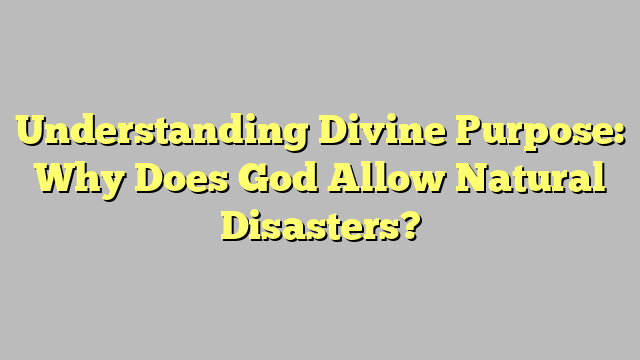Understanding Divine Purpose: Why Does God Allow Natural Disasters?
Understanding Divine Purpose: Why Does God Allow Natural Disasters?
Natural disasters have been a part of human history since time immemorial, causing widespread destruction, loss of lives, and upheaval in societies. These events often lead to existential and philosophical questions about the nature of God and the divine purpose behind such catastrophes. This article explores various perspectives and theories that attempt to understand why God allows natural disasters to occur.
Theological Perspectives on Natural Disasters
Theological interpretations of natural disasters vary widely among different religions and belief systems. Here, we explore a few common perspectives.
Tests of Faith and Character
One prevalent belief is that natural disasters are tests of faith and character. This perspective suggests that such events are opportunities for individuals and communities to demonstrate their resilience, compassion, and solidarity. It is also seen as a test of one’s faith in God, encouraging deeper spiritual reflection and reliance on divine support.
Consequences of Human Actions
Another interpretation is that natural disasters are direct or indirect consequences of human actions. This view often ties to the concept of karma in Eastern religions or the idea of divine retribution in Abrahamic faiths. It suggests that moral and ethical decay, environmental degradation, and disregard for divine laws can manifest in natural calamities as a form of correction or warning.
Part of a Larger Divine Plan
Some believe that natural disasters are part of a larger, incomprehensible divine plan. From this perspective, such events, despite their immediate negative impacts, contribute to the greater good or serve a purpose beyond human understanding. This view encourages trust in divine wisdom and the acceptance of life’s uncertainties.
Philosophical and Ethical Considerations
Beyond theological explanations, natural disasters also raise important philosophical and ethical questions about the nature of God, free will, and the problem of evil.
The Problem of Evil
The existence of natural disasters has long been cited as a challenge to the concept of an omnipotent, omnibenevolent God. This dilemma, known as the problem of evil, questions how a loving and all-powerful God can allow such suffering. Various responses include the free will defense, which argues that God allows natural evil as a consequence of granting humans free will, and the soul-making theodicy, which sees suffering as necessary for spiritual growth and moral development.
Human Responsibility and Free Will
Another philosophical angle considers human responsibility and the role of free will in mitigating the effects of natural disasters. It emphasizes the importance of ethical decision-making in disaster preparedness, response, and recovery efforts. This perspective suggests that while humans may not be able to prevent natural disasters, they have the moral responsibility to minimize suffering and aid those affected.
Scientific Understanding and Human Response
While theological and philosophical discussions provide insight into the divine purpose behind natural disasters, scientific understanding and human response play crucial roles in addressing their impacts.
Advancements in Disaster Preparedness
Scientific advancements have significantly improved disaster preparedness and response. Early warning systems, improved building codes, and community education programs have all contributed to reducing the human and material costs of natural disasters. These efforts reflect a humanistic approach to mitigating the suffering caused by such events.
The Role of Faith-Based and Humanitarian Organizations
In the aftermath of natural disasters, faith-based and humanitarian organizations often play a vital role in providing relief and support to affected communities. These organizations mobilize resources, offer emotional and spiritual support, and assist in long-term recovery efforts, embodying principles of compassion and solidarity.
Conclusion
The question of why God allows natural disasters is complex and multifaceted, encompassing theological, philosophical, and ethical dimensions. While different belief systems offer various explanations, the human response to these events highlights the capacity for resilience, compassion, and collective action. Ultimately, understanding the divine purpose behind natural disasters may remain elusive, but the human capacity to respond with empathy and solidarity reaffirms the strength of the human spirit in the face of adversity.
| Perspective | Key Idea |
|---|---|
| Tests of Faith and Character | Opportunities for demonstrating resilience and faith. |
| Consequences of Human Actions | Manifestations of moral and ethical decay or warnings. |
| Part of a Larger Divine Plan | Events that serve a greater good beyond human understanding. |
| Problem of Evil | Challenge to the concept of an omnipotent, omnibenevolent God. |
| Human Responsibility and Free Will | Emphasis on ethical decision-making in disaster response. |

